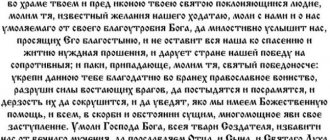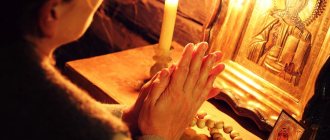Translation of the text from Arabic: “O Allah! Forgive, have mercy and deliver him (we are talking about deliverance from torment, temptation and the darkness of the grave), and show him mercy and a good welcome (that is, make his lot in Paradise good), and make the place of his entry spacious (meaning the grave), and wash him with water, snow and hail, and cleanse him from his sins, just as You cleanse white clothes from dirt, and give him in return a house better than his house, and a family better than his family, and a wife better than his wife, and bring him into Paradise, and protect it from the torment of the grave and from the torment of Fire." (Hadith Muslim bin al-Hajjaj. al-Sahih. Ar-Riyadh, 1421.2000 - 2232) One of the most common questions concerns the dua for a deceased Muslim, whether it is possible to read a dua to the Almighty for the deceased and which one, and also whether it is true that the prayer to the Almighty We cannot read to Allah for the dead non-Muslims?
Listen and download the dua (shown on the left in the photo):
In terms of significance, the dua that is read by the righteous children of a deceased Muslim has the same power as reading the Quran for the deceased, and not only if a person close to him or his child reads the dua or the Quran - any person who reads the dua for the deceased can with your prayers to seek forgiveness for him. The amount of the reward does not depend on whether dua is read at home for the deceased or pronounced in a mosque. The sunnah is to visit the graves of dead Muslims and read dua for them.
When is it worth reading?
Showing respect and serving parents is the Creator’s second favorite deed after performing prayer. Dua for father and mother is carried out during their lifetime, posthumously.
You can also ask the Almighty for unfaithful parents who did not follow the Muslim truth.
The power of prayer is great if you do not ask Allah for forbidden things from the Koran: about an atrocity, about deprivation of a blessing, about harming yourself for the benefit of your father or mother.
The Creator loves duas for raising children.
Acceptable requests from children:
- health, happiness of loved ones;
- barakat;
- getting rid of diseases;
- guidance on the true path;
- support in endeavors;
- fulfillment of non-forbidden desires allowed by religion.
The ritual is performed for parents who have passed away. Ask for heaven and improvement of their situation. Islamic dua for the dead helps to move to a new level in jannat.
Several reasons to accept dua
Some reasons why the likelihood of dua being accepted is high:
- To be a musafir (traveler). The Messenger of Allah (peace be upon him) said: “The dua of three will certainly be accepted: the supplication of the oppressed without a reason, the supplication of a traveler, and the dua of a father for his children.” If the musafir is on a long journey, then the likelihood of accepting the dua is even higher. Because during long wanderings a person endures a lot of suffering, misses his homeland, so his sincerity increases. And sincerity is one of the important reasons for accepting dua.
- Raise your hands. Prophet Muhammad (peace and blessings of Allah be upon him) said: “Truly Allah is generous and shy. If a person raises his hands asking Him, then it is a shame for Him not to give what they ask.”
Types of Muslim prayers for parents
Prayers for parents are said in any form. The essence of the ritual is a direct, sincere connection with Allah. When making an address, do not resort to rhyme, do not try to speak eloquently. An attempt to be graceful in speech distorts the message, dua to the Almighty looks like crafty tongue-tiedness, which is unacceptable for a purposeful and believing Muslim.
Do you need the help of magical powers?
Get an answer to your burning question from a magician and healer. Write about the problem right now, and an expert will suggest a solution online!
Ask a free question View all questions
You can ask Allah for blessings on your loved ones and help in their affairs. Gratitude is expressed for wealthy and happy family members. Posthumous requests are accepted so that loved ones pass away, remaining Islamists, and end up in paradise after the day of judgment.
Dua pronounced for parents so that their sins are forgiven is written in the holy book of the Koran.
Prayers from the Koran:
- Sura 17 – 24:
“God, have mercy and grant them - they raised me as a child” - Sura 14 – 41:
“God Almighty, forgive me, my father, my mother, and all those who believe on the Day of Judgment” - Sura 71 – 28:
“Lord! Have mercy on me, my parents, and all the believers who entered my house. And do not increase anything so much for the infidels as death.”
For my father
In the Islamic faith, dua is a special prayer. A person calls on Allah not impersonally, but in his own words. It is permissible to separate the words of the petition, separately for the father and mother.
Appeals to the Almighty for the father:
| “Lord, bless the lost (name), guide him on the true path and grant him strong faith. Deliver his soul from idleness and peace in Islam." | Suitable for converting renounced or unbelieving parents leading an idle (drunken), dissolute lifestyle back into the faith. |
| “Almighty, help the humble believer, my father, in his deeds. Provide support and guidance on the way - to overcome obstacles and achieve barakat" | Aimed at helping my father in his struggle against the difficulties that have happened in life. |
| “Allah, forgive the deeds committed out of malice, grant him twice for his good deeds. Give him space, wash him with clean water, cleansing him from sinful vices. Reward him on the day of judgment, grant him a place in the Garden of Eden." | Intended to repay the late father for his deeds, to pray for life in another world. |
The Creator knows about the worries and confusion of the human soul. When pronouncing the dua, you need to sincerely believe in the answer and strive for achievement in words. It is not forbidden to pronounce the parent's name.
For mother
To say a separate petition for the mother is to honor the work of a woman who spent her own vitality on giving birth and raising a child in childhood. The ritual expresses the son’s mercy and goodwill towards the labors of loved ones and the will of the Almighty for his birth.
Disrespectful attitude towards parents is the second sin for a true Muslim. The first is a broken marriage and family (divorce).
Dua for mother:
| “Almighty Allah, save my mother from her illnesses. She is submissive in faith, humble and pious towards her children and rewarded her parents according to their good merits. Grant love and have mercy on her during her lifetime." | The petition is intended to heal an illness. |
| “Lord, have mercy and grant (name) to the mother barakat for her deeds and strong faith in Islam. Forgive all sinful deeds and grant as atonement." | Please provide the family (mother) with the missing benefits according to their deserts and guide them on the righteous path (earthly, material) |
| “O Allah Almighty, forgive and exalt (name) among those guided by the righteous path and illuminate the grave, make it spacious and clean for her.” | A request to the Creator to make the afterlife path of the deceased family member righteous and cleansed from earthly sins. |
Other
Appeals for parents come down to asking for happiness, health and a high position in heaven after death.
Dua is an arbitrary prayer; the Creator will satisfy all wishes coming from the heart.
Words must comply with the norms of the Koran and Sharia. The content is formed depending on the cause - death, illness and the motives of the Muslim - help, forgiveness.
Other options:
“Allah, forgive him, grant him and strengthen him in faith”
Pronounced when a parent commits an ungodly act.
“Allah - you are all-forgiving, bringer of mercy, grant (name) strength in faith and save him from the torment of fire. Forgive him and have mercy during his life, reward him for good deeds after death!
Suitable for asking for forgiveness of a loved one and death in Islam.
“Peace and tranquility! May Allah forgive your and our sinful deeds, may we come to you next in the afterlife.”
It is said in places of mass graves.
At the moment of dua, express your innermost feelings in requests and wishes for your parents. The Almighty answers and helps everyone who bares their soul at the moment of pronouncing the text. Indifference in the process is unacceptable. The Creator renounces Muslims.
This dua is the most perfect prayer for forgiveness of sins
The Prophet (sallallahu alayhi wa sallam) recommended reading the prayer of repentance “sayidul-istighfar”. This is the most important prayer of repentance, since its content absorbs all duas of this kind. Because of its deep and broad meaning, it is called “The Pinnacle of Prayers of Repentance.” The hadith of the Prophet (PBUH), narrated by Shadad ibn Aws, says: “The most perfect prayer of repentance is the slave’s appeal to his Creator:
“Allahumma anta Rabbi, la ilaha illya anta, halyaktani wa ana abduk, wa ana a'la a'khdike, wa wa'dike mastata'tu. A’uzu bikya min sharri ma sanat’u, abuu lakya bi – ni’metikya a’leya wa abu bizanbi fagfir lii fa – innahu la yagfiruz – zunuba illya ante.”
“My Allah! You are my Lord. There is no deity other than You worthy of worship. You created me. I am your slave. And I try to the best of my ability to keep my oath of obedience and fidelity to You. I resort to You for protection from the evil of the mistakes and sins I have committed. I thank You for all the blessings You have given, and I ask you to forgive my sins. Grant me forgiveness, for there is no one but You who forgives sins.”
Transcriptions of dua
The arbitrariness of asking for parents determines the right to use prayer in all languages of the world. The Lord is omnipotent, he listens to the torments of the soul and knows all the deepest desires of a person. The creator has access to messages in any language, but Arabic is closer.
Transcription of famous (listed above) prayers:
“Allahum agfir la waiti watakwitu fi aliyman”
Dua for forgiveness of parent's sins.
“I am Rabbi Barak Min Faqad Adrab Iala Altarik Alsahi Wamana Aliyman Alkawi. Ishbae ruvhi min alkasl valsalam fi alislam"
To heal the mother from illnesses.
“Subhana vatealla musidat almumin almuti, validaya, fi imali. Takdim alday valtavhi iala altarik liltagnalub iala alikabat vaham albarakat"
To support the parent in work and any endeavors.
Pronounce dua from the Koran using transcription in Russian. As you get closer to the source, reinforce your request with authenticity.
Ignorance of the Arabic language does not affect the outcome of the ritual. The main thing is frankness with Allah during prayer.
Whose duas may Allah not answer?
“A man on a long journey, with disheveled hair and covered in dust, will raise his hands to the sky, crying, “Oh, Lord! Oh Lord! But his food is haram, his drink is haram, and he was raised on haram. So how will his dua be accepted?”
(Muslim, zakat: 19; Tirmidhi, tafsir: 3)
A person’s bad deeds reduce the strength of his dua, so it is very important to do as many good deeds as possible so that they cover up the bad ones, and then your dua will be stronger and rise very high. In other words, the strength of your dua directly depends on you, on your position before Allah. From your sincerity and faith in what you do.
How to perform dua correctly
The main condition for parents when asking is purity of spirit and body, which will help tune in to contact with God.
Rules for accepting dua:
- Lower your voice to a calm, measured one.
- Keep your arms at shoulder level with your palms facing the sky.
- Believe in the words spoken, choose those that are close in meaning to the emotions.
- Start by listing the 99 names of Allah.
- The appropriate date for prayer is Ramadan, the entire Friday day and the time before dawn.
It is better to turn to the Almighty during a “soft heart” for emotional purity. After satisfying one's vices, calling on God is prohibited. The body and spirit of a person must appear purified before Allah.
How to ask the Almighty for your prayer to be accepted?
We often hear the word “dua” (prayer), especially during Muslim meetings, collective rituals: Friday prayer, dhikr, mawlid, at taziyat (for condolences), when an elderly or pious person is asked to make a dua. However, not everyone knows the meaning and essence of dua and when it is advisable to make it. And also how it should be done so that the Almighty will listen to it and answer it. In order to shed light on this topic, we decided to write this article.
However, I must note that even compliance with all the following recommendations does not guarantee one hundred percent guarantee that the Almighty will answer our prayer. Because He is the Lord of everyone and everything, and we are just His slaves. Our job is to ask and pray to Him, and whether there will be an answer to our prayer or not, no one knows except Allah Himself.
Sometimes it happens that after repeated prayers, without receiving an answer, we give up and lose hope. We must under no circumstances forget that the Almighty is our Creator, that He knows everything that was, is and will be. Therefore, who, besides Him, can know what is best for us? Nobody! Therefore, if the Almighty does not answer our prayer, this does not mean at all that He does not hear us or is angry with us.
It is possible that the Almighty does not answer our prayer because it could harm us, our worldly or afterlife. In any case, our dua does not go unnoticed, in vain. If we never receive an answer to our dua, then the Almighty will reward us for what we asked in this world and did not receive it in the Hereafter, since dua is also ibadat (worship of the Almighty).
Why does Allah not answer dua?
Dua among Muslims is a way of turning to the Lord with a prayer for help, support in trouble, a form of asking for health, the blessings of happiness, a method of obtaining answers to troubling questions.
Allah does not answer prayers for the following reasons:
- The prayer is not made in accordance with Sharia, it contributes to the destruction of the family, and carries a sinful meaning.
- The perpetrator does not have true faith, worships other deities, and does not visit the mosque.
- Allah heard the prayer, but did not fulfill the request. The desire will be fulfilled later, will be rewarded after death, or it will not correspond to God’s providence.
- The person ate non-halal foods.
- the dua was made with a stained conscience, without repentance, without respect for the Lord.
- Wisdom says: when a worthy Muslim makes a prayer, Allah does not fulfill the request because he wants to hear his voice. God answers the unloved slaves immediately.
Knowledge and observance of the rules for reading sacred texts guarantees that the prayer will be heard and accepted. But Allah is merciful and forgives zealous followers for mistakes in making dua.










